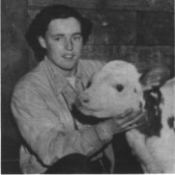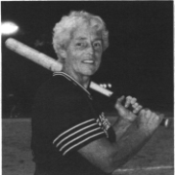




Wilma Briggs is an elementary school teacher. Her feelings about women in the family were not what I had expected, considering her unusual career for the time as a professional baseball player.
I was born in 1930 and grew up on a farm in East Greenwich. There were 11 living children in my family. We had a 60 acre dairy farm, and a lot of work to do. Not a lot of money, but a lot of food. We had our own garden, grew our own food, and played a lot of baseball.
We didn't get a daily newspaper, only the Sunday paper. The kids just didn't do much reading other than the comics and the sports section. We knew there was a war - my father was an air raid warden. We had blackouts where they would have the practice air raids, and he'd go out and stop traffic. That's about as close as I came to the war. None of my brothers were old enough to be in it.
We would get up a 6:30 and go to the barn before breakfast. We had probably 35 milking cows, and we milked by hand. It was only my father, my two older brothers, and myself. We all milked, or the boys would milk and my father and I would feed, which meant I swept out in front so that it was clean for the grain to be put down. When we got home from school, we'd have to clean the barn. Homework was a problem. When I got home I had farm work to do, which meant if I didn't get homework done in school, it didn't get done. But we fit everything around baseball as much as we could because that was our hobby. We had baseball equipment because my father had a team. All the neighborhood kids came to our house to play which was convenient for us because sometimes they helped us finish up the work so we could play earlier.
When the little kids got big enough, they helped in the barn. By the time they were older we had expanded and moved to Pt. Judith. The number of cows that we had, all pure-bred, registered Ayrshires, grew from 35 to 208. There was a lot more work to do then. It took a lot more hands to do the work. That's when the little kids helped.
Did your family make a lot of money from the farm?
(Laughs.) Farmers never make a lot of money. They were always, you know, underpaid for everything. We never had much money, but we never knew that as kids. I thought that we were rich. Most kids didn't have horses. And we had sleds and bicycles and ice skates and that kind of thing. But we hardly ever went anywhere. Once a year we'd go to Fenway Park or something like that, or we'd get a treat to go out for ice cream. We didn't go to the movies very often. Some kids went regularly. We went, if we were lucky, once a month. We had only on family car.
My mother was just a house wife, but you know, I think back on what she did. She reared 11 children, helped in the garden, helped pick the beans, canned beans and tomatoes-she did so many things. Laundry for 12, 13 people, cooked for our family, and half the neighborhood. Everybody seemed to eat at our house. The canning that she did was absolutely incredible. She canned like three hundred quarts of vegetables. We never had to buy canned vegetables-ever. We'd just go down cellar and bring them up.
I remember during the war years I was in the 4H and I had a victory garden. As a matter of fact, it won a $25 war bond. They were called savings bonds until the war, and then they were called war bonds. And I won a war bond and a camp scholarship because of my victory garden.
What type of clothing did you wear?
Well, I wore dungarees, even to school. I wore them every day because we didn't have a lot of money. My mother and father had to buy dungarees for the boys and I'd say, "Well, get me some too." I was wearing them in the barn. And we wore the same style clothes working as we did to school. By the time I got to high school and started playing basketball, and was on the gym team - I needed slacks anyway, so I wore slacks or dungarees to school, and I got away with it. I was the only girl that did, but then I was the only girl who played on the boys' basketball team, too.
Had it not been for the war, I never would have played professional baseball. That started because of the war. People didn't have money to go places. Phil Wrigley of the Chicago Cubs was certain that all the men would be drafted, and the major league ballparks would be empty. That's the reason he started that league, the All-American Girls' Professional Baseball League.
So, because of the war, I got that chance. That league started in 1943, and I joined it after high school in 1948. Had it not been for the war, that part of my life would never have come to pass. And I think because I went out there and played ball-I met a lot of people from all over the United States, Canada, and Cuba, which I never would have done. I traveled, lived in the best hotels, ate in restaurants, lived in private homes-that's an experience. I think it gave me the courage years later to say, "I think I'll go to college." The league ended finally in '54. All those things that people couldn't do during the war years they could now do. They had money in their pockets, gasoline in their gas tanks, and television came out. I think that's what broke the back of that league. People could do so much more after the war.
How did the war change your life?
I think our whole country changed after the war when all the "Rosie the Riveters" continued to rivet when the war was over. I really believe that's one of the major problems in our world today. I think that was the beginning of the downfall of the family. The family unit started to disintegrate right after the war when Rosie kept riveting. Families found out that they could have two incomes. And now, 45 years later, parents need those two incomes to survive. Because of that, nobody's home. The kids know their baby-sitter better than they know their parents. They know their teacher better than they know their parents. Everybody seems to be going in a different direction. And I really think that all happened because Rosie was needed to rivet during the war, but when the war was over, she didn't stop.
Copyright 1995